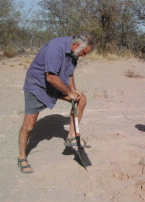

Ph.D. 1989, Arizona State University,
Tempe
Research InterestsDr. Johnson has broad research interests in the evolutionary ecology of North American seed-harvester ants. Dr. Johnson’s research focuses on life history, nest founding strategies, biogeography, community structure, and hybridization and caste determination, primarily using the seed-harvester ant genus Pogonomyrmex. Dr. Johnson’s interests also include the ant fauna of Baja California, Mexico, and adjacent areas of mainland Mexico. Brief descriptions of several larger ongoing projects follow.
The seed-harvester ant genus Pogonomyrmex is proving to be an incredibly rich and diverse group for the study of life history, particularly for examining the evolution of nest founding strategies. Nest founding strategies in Pogonomyrmex include the gamut of possibilities from dependent nest founding in the social parasites to independent nest founding by queens that can be obligate foragers, facultative foragers, or fully claustral. One species also has both microgyne and macrogyne queens. Most species appear to be haplometrotic and monogynous, but one population of P. californicus is pleometrotic and apparently polygynous. The subgenus Ephebomyrmex includes additional diversity in regard to reproduction, with species that have apterous queens (P. huachucanus), or species that have polygyne colonies of dealate queens or intermorph queens (P. pima and P. imberbiculus). Ongoing studies examine the various life histories and colony structure of these species with the long-term goal of developing a broad evolutionary picture of Pogonomyrmex in North America.
Along with the higher attines, the genus Pogonomyrmex is one of the few social insect groups in which the queens mate with multiple males. Current research, in collaboration with Juergen Gadau, focuses on determining mating frequency in several of the more primitive species in the subgenus Ephebomyrmex, along with comparing mating frequency of dealate and intermorph queens in P. pima. We are also comparing mating frequency for monogynous and polygynous populations of P. californicus.
Hybridization appears to occur somewhat commonly in several species of Pogonomyrmex, but has been little studied since the excellent revisionary work of the genus by Arthur Cole. Recent evidence suggests that genetic caste determination of workers and alate queens is related to hybridization between P. barbatus and P. rugosus. Current research, in collaboration with Jennifer Fewell and Juergen Gadau, focuses on examining patterns of hybridization and the genetics of caste determination.
Dr. Johnson is also an instructor for the Ant Course, which is held annually in Portal, Arizona.
